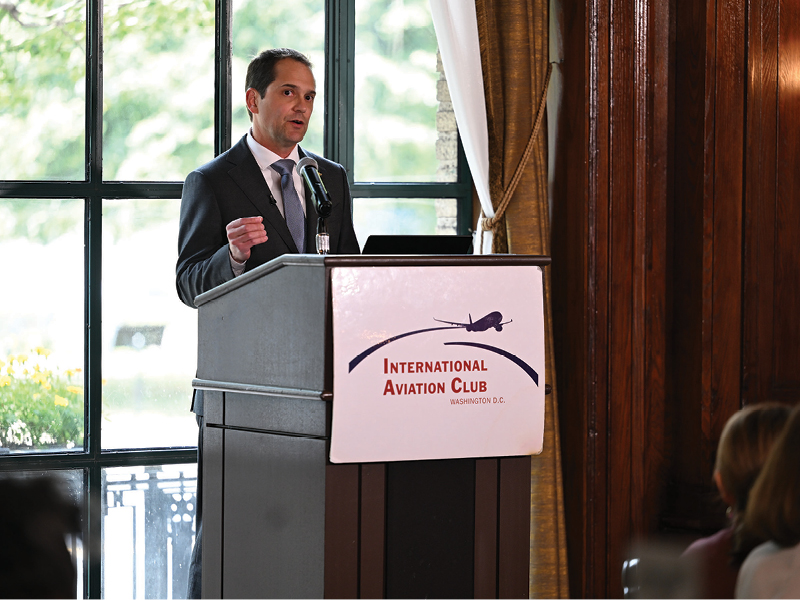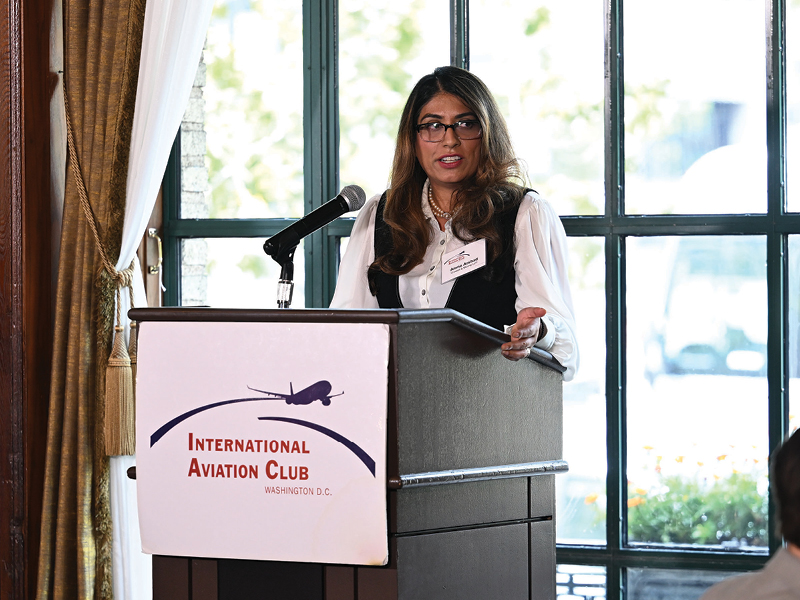Ambrosi Addresses International Aviation Club of Washington, D.C.
Lauds Union’s Recent Successes, Warns about Threat to Remove Pilots from the Flight Deck
By Gavin Francis, Senior Aviation Writer

Capt. Jason Ambrosi, ALPA’s president, addresses members of the International Aviation Club, announcing the release of the union’s recent white paper in opposition to reduced-crew operations and warning about the threat it poses to aviation safety.
During remarks made to members of the International Aviation Club of Washington, D.C., on June 25, Capt. Jason Ambrosi, ALPA’s president, talked about a number of the union’s recent successes, including its efforts to lobby Congress on a new five-year FAA reauthorization bill, which the president signed into law in May. The legislation provides for long-term funding intended to strengthen aviation safety, advance technology and innovation, and modernize the national airspace system. The last five-year FAA authorization occurred in 2018. Since its expiration, Congress temporarily funded the agency through short-term extensions.
“We certainly all worked hard to get that done,” said Ambrosi. “I’m grateful to have collaborated with many of you to get that bill passed with the improvements that our industry needs, and we did it without compromising on safety.”
ALPA’s president also took the opportunity to announce the release of the latest edition of the Association’s white paper on its opposition to reduced-crew operations. The union has long worked to raise awareness of the threat that removing pilots from the flight deck poses to aviation safety.
“Today the Air Line Pilots Association is releasing a white paper on the dangers of these schemes to operate with fewer than two pilots on the flight deck during all phases of flight,” he remarked. “Our white paper reinforces the well-established fact that pilots can’t be replaced through advances in technology and outlines the benefits of having at least two pilots on the flight deck. Reduced-crew operations not only suffer the safety risks of higher workloads for the remaining pilot, or the incapacitation of the single pilot, but it also puts aviation safety on the edge of what technology is capable of.”
Ambrosi’s speech at the International Aviation Club marks a period in which ALPA leaders have been engaged in efforts to combat unfair competition within the marketplace as well as attempts to erode workers’ rights. He pointed to a number of the Association’s recent victories on those fronts, highlighting the union’s work with its strategic partners.

Amna Arshad, president of the International Aviation Club, introduces Capt. Jason Ambrosi at the group’s June 25 luncheon at the Army and Navy Club in Washington, D.C.
“Earlier this year, ALPA joined with A4A as well as other unions in asking the U.S. government to ensure workers and businesses are guaranteed equality of access in the marketplace, free from the existing harmful anticompetitive policies of the Chinese government,” noted Ambrosi. “Also last year, we joined forces when the Dutch government announced it would implement flight caps due to ‘noise reduction’ into Amsterdam Airport Schiphol, conveniently cherry-picking JetBlue, a relatively new entrant, to be on its list of cuts. Together, we ensured that JetBlue maintained its slots, and we held the Dutch government accountable to uphold the U.S.-EU Open Skies agreement.
“And last week, we earned another win for safety as the FAA announced that it will propose a rule to close the public-charter loophole. That loophole allows some airlines to operate at a lesser standard while sharing the same airspace, with the same passengers, with essentially scheduled flights, from largely the same airports, which is unacceptable.”
Ambrosi also expressed his appreciation for the Biden administration’s strong support for workers’ rights, noting that labor standards have a place in the U.S. government’s determination of what is in the public interest for aviation.
“Whether before the International Labor Organization, the International Civil Aviation Organization, or somewhere else, the highest standard for labor should always be a central consideration for the United States,” ALPA’s president observed, referencing a recent decision that upheld workers’ rights in a case that involved one of the Association’s pilot groups. “I’m pleased to report that labor rights were central to a decision reached last week by the Tenth Circuit U.S. Court of Appeals when it rejected an attempt by Breeze Airways to undermine the rights of some of our newest ALPA members. This victory is significant as it reaffirms decades of established precedent that protects the rights of employees to organize. Together with my colleagues in labor who are here today, and others across the industry, we’ve helped shape the airline industry into not just an economic driver for our country, but the safest mode of transportation in the world.
“Everyone in this room should be proud of the safety record that we’ve built,” Ambrosi asserted. “We did this together through decades of hard work and hard lessons learned in the wake of tragedies. Because of the success in making air travel safer, our customers trust that when they board one of our flights, they’ll get to their destination safely. We’ve earned their trust. But we’re always one accident away from losing it.”
In closing, Ambrosi again highlighted the issue that he views as the greatest threat to aviation safety, the efforts by some within the airline industry to lower the standard of having at least two well-trained, experienced, and well-rested pilots on the flight deck at all times. That threat has far-reaching implications for international aviation as efforts are currently under way in Europe to move forward with the reduced-crew concept.
“The threat of reduced-crew operations undermines our responsibility to ensure safety. Make no mistake. If we permit these operations in other parts of the globe, it will put unnecessary competitive pressures on our U.S. airlines, which oppose this degradation to safety. Together, we must work to protect our unparalleled safety record. Because the stakes are too high to gamble with safety in aviation.”
Established in 1961, the International Aviation Club of Washington, D.C., has served as a forum for leaders within the aviation community to discuss issues affecting commercial aviation, both domestically and internationally. The organization engages with government and private-sector decision-makers who affect aviation policy in an effort to foster and promote international aviation.

